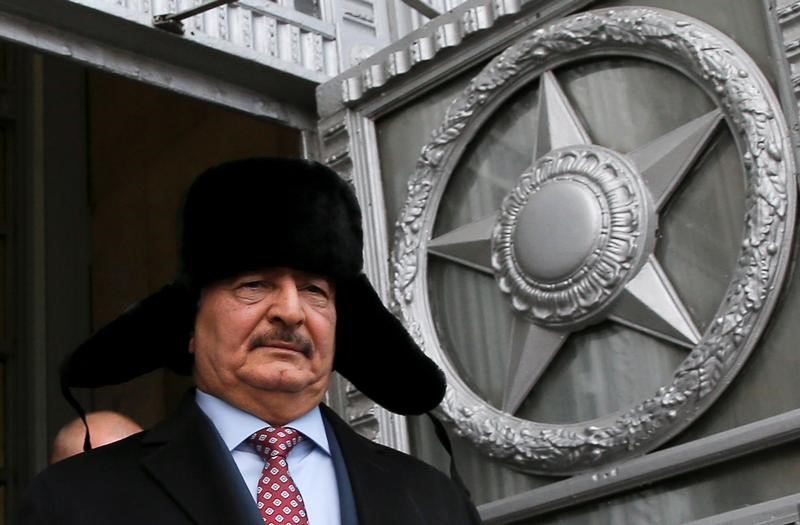ROME (Reuters) - Eastern Libya's dominant military figure has no plans to resume talks with his U.N.-backed rival in the west, according to comments in an interview that may further dent foreign hopes of an end to years of conflict in the divided country.
Strongman Khalifa Haftar and Fayez Seraj, who heads the internationally recognised administration in Tripoli, were expected to meet in Algiers in coming days, a source close to the Algerian government said.
They were to discuss the possibility of forming a government of national union, the source told Reuters.
But Haftar said talks with Seraj begun 2-1/2 years ago had yielded no result and the existing state of war now required combat rather than politics.
"Once the extremists are defeated we can go back to talking about democracy and elections. But not now," Haftar was quoted as telling Tuesday's edition of Italian newspaper Corriere della Sera.
The outlook for Seraj's government, already uncertain as it struggles to fulfil Western hopes that it could bring stability to Libya, worsened on Monday when one of its deputy leaders announced his resignation, saying it had failed to tackle urgent problems.
Haftar said his forces now controlled about 80 percent of the country, according to the newspaper.
A deeply divisive figure portrayed by his rivals as a military strongman seeking national power, he has been waging a campaign against Islamists and other opponents in eastern Libya for more than two years.
Haftar has close ties to Egypt and the United Arab Emirates, and said that on a recent trip to Moscow he had tried to reactivate contracts there that were interrupted in 2011, when an uprising toppled former Libyan leader Muammar Gaddafi.
An arms embargo imposed by the U.N. Security Council is stopping any weapons arriving in Libya, but Russian President Vladimir Putin is trying to lift it, Haftar said.
He said his patrols were ensuring the rule of law was being upheld around the oil ports of Ras Lanuf, Brega and Es Sider.
"If our army controlled our southern border, there would be fewer problems for everyone. And the same is true for the energy plants so dear to Italy. I would be very happy to discuss this with the managers of (oil major) Eni," Haftar said.

Libyans "had no idea what democracy meant" when elections were held in 2012, drawing a line under 42 years of Gaddafi's rule, he said. "They were simply not ready."